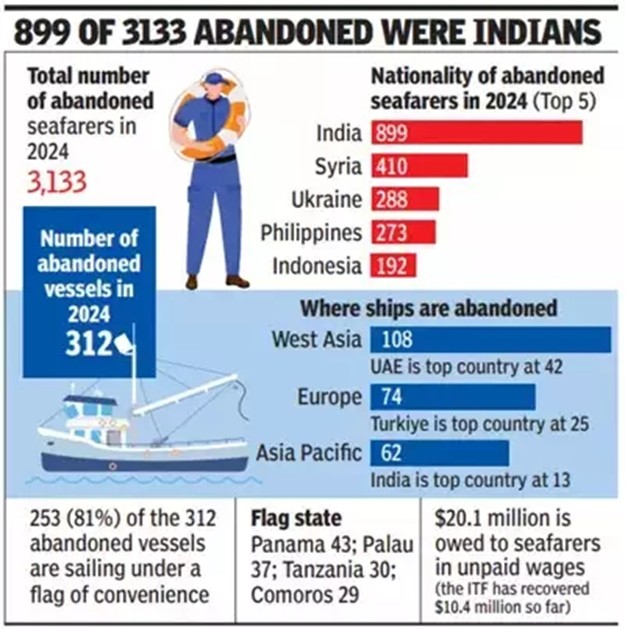While IMO and ITF must enforce stricter penalties and monitoring, India needs tighter regulations, bilateral agreements, and financial safeguards to protect its seafarers
The Hidden Human Cost of Global Trade
The global economy thrives on maritime trade, with over 80% of world trade by volume transported via sea, according to the International Maritime Organization (IMO) .Yet, behind this colossal industry lies a stark reality: the abandonment of seafarers. These men and women, the backbone of global trade, are often left stranded in foreign ports, unpaid, and forgotten.
Seafarer abandonment is not just a moral failing but a systemic issue rooted in the opaque nature of maritime labour practices. Despite international regulations, weak enforcement allows shipowners to evade accountability.
The Scale of the Problem
The International Labour Organization (ILO) defines abandonment as a situation where a shipowner fails to cover the cost of a seafarer’s repatriation, deprives them of necessary maintenance and support, or severs ties, including withholding wages for at least two months.
According to the ILO’s database, 103 reported cases in 2022 affected over 1,000 seafarers (ILO, 2023). In 2024, the crisis reached unprecedented levels, with 3,133 seafarers abandoned globally—an 87% increase from the 1,676 cases in 2023, as per the International Transport Workers’ Federation (ITF).
899 Indian seafarers abandoned in 2024
The abandonment of seafarers is a severe humanitarian crisis that exposes thousands of sailors to financial distress, mental trauma, and even life-threatening conditions. The reported figure of 899 Indian seafarers abandoned in 2024—the highest among all nationalities—underscores the vulnerability of Indian maritime workers in a rapidly expanding but poorly regulated global shipping industry. The 136% rise in vessel abandonment compared to 2023 suggests a worsening crisis that demands immediate intervention at both the international and national levels.
The Murkiness of Maritime Labor Practices
The shipping industry operates within a complex system of Flags of Convenience (FOCs), weak labour laws, and inadequate regulatory enforcement. FOCs allow shipowners to register their vessels in countries with minimal oversight, helping them circumvent labour laws and exploit workers. The ITF reports that over 70% of the global fleet is registered under FOCs (ITF, 2023). In 2024, 81% of abandoned vessels sailed under FoCs, allowing shipowners to bypass stringent labour and safety regulations (ITF, 2024).
Panama, Liberia, and the Marshall Islands remain key enablers of these exploitative practices.
The systemic exploitation under FOCs is deliberate. By registering ships in lenient jurisdictions, shipowners minimize costs while maximizing profits, often leaving seafarers vulnerable. Many vessels operate with skeletal crews, leading to exhaustion and increased risk. When financial trouble strikes, shipowners abandon their vessels, frequently without consequences. While the IMO and ILO have introduced regulations to curb such practices, enforcement remains inconsistent due to jurisdictional complexities.
Adding to the exploitation, many seafarers are recruited through manning agencies that act as intermediaries between shipowners and crew members. These agencies often charge exorbitant fees, leaving seafarers in debt before they even set sail.
Once at sea, these workers are isolated, with limited access to legal recourse or support systems. When abandoned, they are left stranded in foreign ports, unable to return home due to unpaid wages and lack of repatriation funds.
 Source: TOI
Source: TOI
Humanitarian Crisis
- Seafarers often go months without pay, with some left without basic provisions, fuel, or medical aid.
- They suffer from mental and physical distress, being stranded in foreign ports or international waters.
- Many abandoned ships are in conflict zones or unsafe waters, making rescue operations difficult.
Legal and Financial Complications
- Many cases involve obscure ownership structures that make it hard to trace responsibility.
- Employers evade financial liabilities by registering vessels under flags of convenience (FOC), which have weak enforcement mechanisms.
- Seafarers are often trapped by legal loopholes, unable to leave vessels due to immigration rule
India’s Maritime Workforce at Risk
- With over 200,000 Indian seafarers in the global shipping industry, the rising abandonment cases put thousands more at risk.
- Lack of insurance enforcement and weak protection mechanisms allow unscrupulous shipowners to exploit Indian workers disproportionately.
Countermeasures at the International Level
The Role of Global Bodies & The Need for Reforms
Tackling the abandonment crisis requires coordinated action from global institutions, governments, and the shipping industry. While the IMO and ILO have taken steps to raise awareness and improve reporting mechanisms, more must be done.
Stronger Enforcement of the MLC: FoC countries must impose penalties on shipowners who fail to meet their obligations. Seafarers should have guaranteed legal support and financial security.
Government Intervention: Labor-supplying nations must educate and support seafarers, ensuring they understand their rights. Establishing repatriation funds will prevent workers from being left stranded.
Industry Accountability: Shipping companies must adopt best practices, prioritizing fair wages, safe working conditions, and transparent contracts. Industry leaders should push for stronger regulations to ensure seafarer welfare.
Strengthening IMO and ITF Regulations
The International Maritime Organization (IMO) must strictly enforce the Maritime Labour Convention (MLC), 2006, ensuring shipowners fulfill their obligations.
The International Transport Workers’ Federation (ITF) should create a global fund to support abandoned seafarers, financed by a mandatory contribution from shipowners.
Blacklisting and Sanctioning Defaulting Shipowners
- Governments and maritime authorities must blacklist shipowners with a history of abandonment.
- Defaulting shipowners should face strict financial penalties and seizure of their assets to compensate seafarers.
- Strengthen the Port State Control (PSC) mechanism to prevent ships owned by habitual offenders from docking at major ports.
Eliminating Flags of Convenience (FOC)
- Many abandoned vessels are registered under flags of convenience (e.g., Panama, Liberia, Marshall Islands) to avoid regulatory scrutiny.
- IMO should create a common international register that holds owners accountable regardless of flag registration.
Mandatory Seafarer Wage Insurance
- Governments should mandate compulsory wage insurance, ensuring salaries are deposited in escrow accounts so that even if a company goes bankrupt, sailors are paid.
Establishing Rapid Response Maritime Task Forces
International cooperation is needed to form task forces that respond quickly to abandoned seafarers.
- These teams, operated jointly by ITF and IMO, should have access to emergency funds and legal teams to fast-track repatriation and compensation.
Countermeasures at the Indian Government Level
Strict Licensing for Recruitment Agencies
The Directorate General of Shipping (DGS) must implement stricter licensing and background verification for agencies recruiting Indian seafarers.
Any agency found sending seafarers to high-risk vessels should face permanent blacklisting and legal prosecution.
Mandatory Seafarers’ Protection Fund
India should establish a Seafarers’ Welfare & Protection Fund, where a percentage of Indian shipping company revenues is reserved for crisis management.
The fund should provide immediate assistance to stranded sailors, covering food, wages, and repatriation.
Bilateral Agreements with Major Maritime Nations
India should sign agreements with major shipping nations (Singapore, Greece, UK, UAE) to ensure that Indian seafarers working on foreign vessels have guaranteed protections.
Fast-Track Repatriation Mechanisms
The Indian government must enhance diplomatic efforts to quickly bring back stranded sailors by setting up:
- A special maritime crisis cell within embassies in key maritime hubs like Dubai, Singapore, and Hong Kong.
- A dedicated emergency helpline for Indian seafarers facing abandonment or wage disputes.
Criminal Action Against Indian Shipowners Who Abandon Workers
Indian shipowners involved in abandonment should be prosecuted under strict labor laws and maritime safety regulations.
Implement travel bans and asset seizures for defaulting shipowners to prevent repeat offenses.
Pre-Deployment Contracts with Stronger Legal Clauses
Ensure every Indian seafarer signs a legally enforceable contract, vetted by the Indian Maritime Authority, which guarantees:
- Full salary payment regardless of ship abandonment.
- Guaranteed repatriation paid for by the shipping company.
Use of Technology for Real-Time Monitoring
The government should launch a centralized tracking system where seafarers can report real-time distress via mobile apps, directly linking them to maritime authorities.
Urgent Measures Required
Urgent reforms are needed to address this crisis:
- Stronger Legal Frameworks: International conventions must impose stricter penalties on shipowners who abandon their crew. Governments should work towards creating an international tribunal for seafarer abandonment cases.
- Enhanced Port State Control: Countries must strengthen inspections and impose immediate sanctions on vessels linked to abandonment cases.
- Mandatory Seafarer Welfare Funds: Shipping companies should contribute to an international fund that ensures wages and repatriation for abandoned seafarers.
- Transparency in Shipping Registries: Flags of Convenience must be held to higher standards, with greater scrutiny of their enforcement mechanisms.
- Greater Role for Trade Unions: Organizations like the ITF should be legally empowered to advocate more effectively for abandoned seafarers.
The abandonment of Indian seafarers is a growing crisis that requires strong international and national action. While IMO and ITF must enforce stricter penalties and monitoring, India needs tighter regulations, bilateral agreements, and financial safeguards to protect its seafarers. The Indian government must actively monitor recruitment agencies, enforce wage insurance, and provide emergency repatriation mechanisms to prevent further humanitarian disasters in the maritime industry.
The abandonment of seafarers exposes deep-seated inequalities in the global economy. These workers, essential to global trade, deserve dignity, fairness, and justice. The world cannot continue to benefit from maritime trade while ignoring the plight of those who make it possible.
If decisive action is not taken, seafarer abandonment will remain a stain on the maritime industry—one that exposes the hypocrisy of a world reliant on shipping but unwilling to protect those who sustain it.








